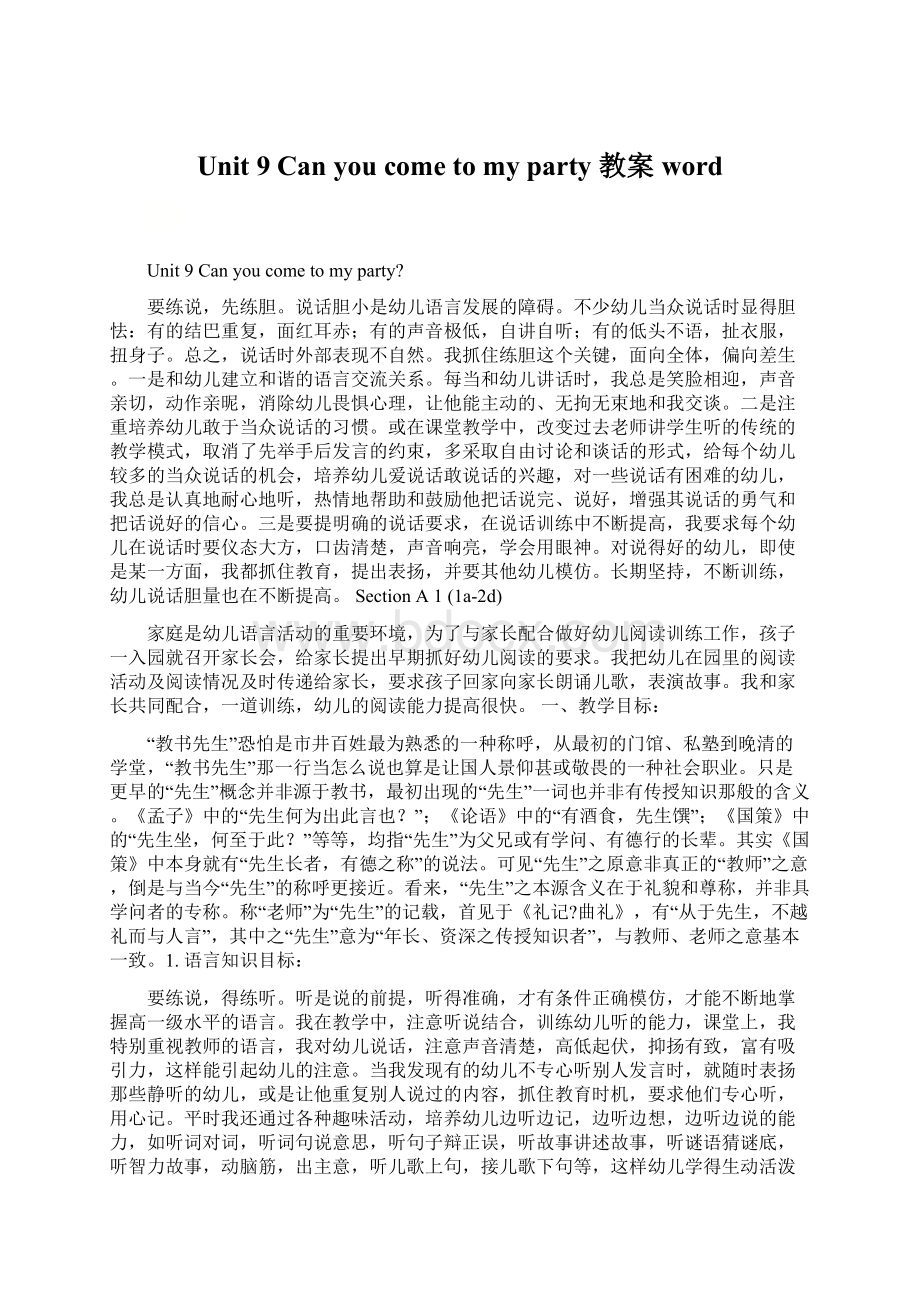Unit 9 Can you come to my party 教案word.docx
《Unit 9 Can you come to my party 教案word.docx》由会员分享,可在线阅读,更多相关《Unit 9 Can you come to my party 教案word.docx(32页珍藏版)》请在冰豆网上搜索。

Unit9Canyoucometomyparty教案word
Unit9Canyoucometomyparty?
要练说,先练胆。
说话胆小是幼儿语言发展的障碍。
不少幼儿当众说话时显得胆怯:
有的结巴重复,面红耳赤;有的声音极低,自讲自听;有的低头不语,扯衣服,扭身子。
总之,说话时外部表现不自然。
我抓住练胆这个关键,面向全体,偏向差生。
一是和幼儿建立和谐的语言交流关系。
每当和幼儿讲话时,我总是笑脸相迎,声音亲切,动作亲昵,消除幼儿畏惧心理,让他能主动的、无拘无束地和我交谈。
二是注重培养幼儿敢于当众说话的习惯。
或在课堂教学中,改变过去老师讲学生听的传统的教学模式,取消了先举手后发言的约束,多采取自由讨论和谈话的形式,给每个幼儿较多的当众说话的机会,培养幼儿爱说话敢说话的兴趣,对一些说话有困难的幼儿,我总是认真地耐心地听,热情地帮助和鼓励他把话说完、说好,增强其说话的勇气和把话说好的信心。
三是要提明确的说话要求,在说话训练中不断提高,我要求每个幼儿在说话时要仪态大方,口齿清楚,声音响亮,学会用眼神。
对说得好的幼儿,即使是某一方面,我都抓住教育,提出表扬,并要其他幼儿模仿。
长期坚持,不断训练,幼儿说话胆量也在不断提高。
SectionA1(1a-2d)
家庭是幼儿语言活动的重要环境,为了与家长配合做好幼儿阅读训练工作,孩子一入园就召开家长会,给家长提出早期抓好幼儿阅读的要求。
我把幼儿在园里的阅读活动及阅读情况及时传递给家长,要求孩子回家向家长朗诵儿歌,表演故事。
我和家长共同配合,一道训练,幼儿的阅读能力提高很快。
一、教学目标:
“教书先生”恐怕是市井百姓最为熟悉的一种称呼,从最初的门馆、私塾到晚清的学堂,“教书先生”那一行当怎么说也算是让国人景仰甚或敬畏的一种社会职业。
只是更早的“先生”概念并非源于教书,最初出现的“先生”一词也并非有传授知识那般的含义。
《孟子》中的“先生何为出此言也?
”;《论语》中的“有酒食,先生馔”;《国策》中的“先生坐,何至于此?
”等等,均指“先生”为父兄或有学问、有德行的长辈。
其实《国策》中本身就有“先生长者,有德之称”的说法。
可见“先生”之原意非真正的“教师”之意,倒是与当今“先生”的称呼更接近。
看来,“先生”之本源含义在于礼貌和尊称,并非具学问者的专称。
称“老师”为“先生”的记载,首见于《礼记?
曲礼》,有“从于先生,不越礼而与人言”,其中之“先生”意为“年长、资深之传授知识者”,与教师、老师之意基本一致。
1.语言知识目标:
要练说,得练听。
听是说的前提,听得准确,才有条件正确模仿,才能不断地掌握高一级水平的语言。
我在教学中,注意听说结合,训练幼儿听的能力,课堂上,我特别重视教师的语言,我对幼儿说话,注意声音清楚,高低起伏,抑扬有致,富有吸引力,这样能引起幼儿的注意。
当我发现有的幼儿不专心听别人发言时,就随时表扬那些静听的幼儿,或是让他重复别人说过的内容,抓住教育时机,要求他们专心听,用心记。
平时我还通过各种趣味活动,培养幼儿边听边记,边听边想,边听边说的能力,如听词对词,听词句说意思,听句子辩正误,听故事讲述故事,听谜语猜谜底,听智力故事,动脑筋,出主意,听儿歌上句,接儿歌下句等,这样幼儿学得生动活泼,轻松愉快,既训练了听的能力,强化了记忆,又发展了思维,为说打下了基础。
1)能掌握以下单词:
prepare,preparefor,exam,flu,available,anothertime,until,hang,hangout,catch
宋以后,京师所设小学馆和武学堂中的教师称谓皆称之为“教谕”。
至元明清之县学一律循之不变。
明朝入选翰林院的进士之师称“教习”。
到清末,学堂兴起,各科教师仍沿用“教习”一称。
其实“教谕”在明清时还有学官一意,即主管县一级的教育生员。
而相应府和州掌管教育生员者则谓“教授”和“学正”。
“教授”“学正”和“教谕”的副手一律称“训导”。
于民间,特别是汉代以后,对于在“校”或“学”中传授经学者也称为“经师”。
在一些特定的讲学场合,比如书院、皇室,也称教师为“院长、西席、讲席”等。
2)能掌握以下句型:
①—CanyoucometomypartyonSaturdayafternoon?
—Sure,I’dloveto.
②—CanyougotothemoviesonSaturday?
—I’msorry,I’mnotavailable.Ihavetoomuchhomeworkthisweekend.
③That’stoobad.Maybeanothertime.
④Sure.Thanksforasking.
⑤Samisn’tleavinguntilnextWednesday.
2)能了解以下语法:
用情态动词can来表达邀请。
3)学会表达邀请,学会对邀请进行恰当的答复或拒绝。
2.情感态度价值观目标:
学会人际交往的基本常识,学会有礼貌地邀请别人以及回答别人的邀请的方式。
理解“义务”涵义,学会承担自己应尽的义务,能够在班级以及社会生活中担当一定的责任。
理解人与人之间的真情,学会珍惜朋友之间、师生之间的友情。
二、教学重难点
1.教学重点:
1)运用所学提出邀请,接受邀请和拒绝邀请。
2)正确使用can,might,must等情态动词。
2.教学难点:
1)扎实掌握重点词汇和表示邀请的句型并能灵活运用。
2)通过听力练习和小组合作,理解并能提出邀请并作肯定回答。
三、教学步骤
Ⅰ.Lead-in
在大屏幕上创设场景引入对话讨论。
T:
Whatdoyoudoonweekends?
Ⅱ.Newwords
prepare,preparefor,exam,flu
III.Workon1a
T:
Matchthephraseswiththepictures(a-e).
IV.Workon1b
1.T:
Nowlistentotherecordingandwritethenamesnexttothecorrectstudentsinthepicture.
2.Playtherecordingforthefirsttime.Studentsonlylisten.Playtherecordingasecondtime.Writethenameofeachpersonnexttohisorherpicture.
3.Playtherecordingagain.ChecktheanswerswiththeSs.
V.Role-playtheconversationfromlisteningtext
AskSstopayattentiontohowtomake,acceptanddeclinetheinvitation.
SunNing:
Hey,Ted.CanyoucometomypartyonSaturdayafternoon?
Ted:
I’msorry,Ican’t,SunNing.Ihavetohelpmyparents.
SunNing:
Toobad.Howaboutyou,Jenny?
Canyoucometomyparty?
Jenny:
I’dloveto.
SunNing:
Tim?
Whataboutyou?
Tim:
Whenisit?
SunNing:
Saturdayafternoon.
Tim:
Oh,no,Ican’t.Ihavetoprepareforanexam.
SunNing:
Whataboutyou,Wilson?
Wilson:
Sorry,Imustgotothedoctor.
SunNing:
Anna,canyoucome?
Anna:
Ican’t,SunNing.Imighthavetomeetmyfriend.
Kay:
Ican’teither,SunNing.Ihavetheflu.
SunNing:
That’stoobad,Kay.Oh,maybenexttime.Whatasmallparty!
VI.Groupwork
Workon1c.
Letsomegroupsaskandansweraccordingtopicturein1a.
VII.Listening
Workon2a:
1.Readthesentencesin2a.TellSstheywilllistentosomesentences.Theyshouldlistenandcirclethewords“can”or“can’t”inthebracket.
2.PlaytherecordingfortheSstolistenandcirclethewords.
3.Playtherecordingagaintochecktheanswers.
Workon2b:
1.LetSsreadthechartbelow.TellSs,thistimetheymustwritethereasonsinthechart.Makesuretheyknowwhattodo.
2.PlaytherecordingfortheSstowritethereasonsinthechart.
3.Playtherecordingagaintochecktheanswers.
4.Role-playtheconversation:
Conversation1
Anna:
Hi,Jeff?
CanyoucometomypartyonSaturday?
Jeff:
I’msorry,I’mnotfree.ImighthavetomeetmyfriendonSaturday.
Conversation2
Anna:
Hello,Mary!
CanyoucometomypartyonSaturday?
Mary:
I’dloveto.DoIneedtobringanything?
Anna:
No,I’llbuyallthefoodanddrinks.
Conversation3
Anna:
May,canyoucometomypartytomorrow?
May:
I’mafraidnot.Ihavetheflu.
Anna:
Oh,that’stoobad.Well,drinklotsofhotwaterandgetlotsofsleep.
Conversation4
Anna:
MeiLing,canyoucometomypartyonSaturday?
MeiLing:
Sorry,butI’mnotavailable.Imuststudyforamathtest.
Anna:
OK.Goodluck!
Conversation5
Anna:
Hey,Paul.CanyoucometomypartyonSaturday?
Paul:
Sure.Itsoundsgreat.Whenwillitstart?
Anna:
Around6:
00p.m.Seeyouthen.
Paul:
Seeyou.
5.ListenandcompleteAnna’sdiary.
I’m________apartyonSaturday.Iasksomeofmyfriendstomyparty.Mary
andPaulwouldlove________,butJeff____________meethisfriend.May
can’tcome,_____.Shehasthe_____.MeiLingisnot________.She_____study
fora_____test.
VIII.Newwords
available,anothertime,until,hang,hangout,catch
.Pairwork
1.TellSstolookatthereasonsinthechartin2b.Thenwritesomemore.
2.LetSsreadconversationsin2c.
3.Sspracticetheconversationsusingthereasonsinthechartontheright.
4.Asksomepairstoactouttheirconversations.
.Reading
1.Readtheconversationandanswerthequestions.
1)Whatdidtheydolastfall?
_____________________________________
2)WhatdoesNickhavetodoonSaturday?
_____________________________
3)Whenwilltheyhangout?
_____________________________
2.LetSspracticetheconversationwiththeirpartners.Thenletsomepairsactoutthe
conversation.
3.Fillintheblanksaccordingtotheconversation.
Jeff’s_______Sam_____Xi’anisgoingtovisithimonSaturday.Jeffandhis
friendNick_____bikeridingtogetherlastfallwhenSamcame.Butthis
SaturdayNick_____cometoJeff’shousebecausehe_______________an
examonMonday.Luckily,Samisn’tleaving______nextWednesday.Nick
can______themonMondayandthen_________togetheronMondaynight.
.Languagepoints
1.I’msorry.I’mnotavailable.
此句中的available表示“有空;不忙;有时间交谈,聊天”,其后还可用todo
引出具体的事情。
例如:
Areyouavailabletomorrowmorning?
明天早上你有空吗?
I’mafraidI’mnotavailabletohelpwiththeschoolshowonthe19th.
我怕是没空来帮着准备学校19号演出了。
2.IhaveanexamonMondaysoImustprepareforit.
prepare作动词,意为“使做好准备;把……准备好”,常用短语有prepareforsth.和preparetodosth.,前者意为“为某事做准备”,后者意为“准备做某事”。
如:
Weareworkinghardtoprepareforthemeeting.
Ipreparetowritesomethingaboutmytrip.
【链接】prepare的名词形式preparation,短语makepreparationsforsth.意为“为某事做准备”,与短语prepareforsth.同义。
如:
They’remakingpreparationsforthetest.=They’repreparingforthetest.
【运用】完成句子,每空词数不限。
(1)他们一周前开始为这次旅行做准备。
Theybeganto______________________________thistripaweekago.
preparefor/makepreparationsfor
(2)你准备给凯特写信吗?
Doyou_______________toKate?
preparetowrite
3.Samisn’tleavinguntilnextWednesday.
在英语中,not…until…是一个常见句型,表示“直到……才……”。
在口语中,还
可使用till代替until,构成not…until…结构。
e.g.Don’tleavetoday’sworktilltomorrow.
不要把今天的事留到明天去做。
Ididn’tgotobedlastnightuntilpastmidnight.
昨晚我过了午夜12点才睡。
【运用】将下列句子翻译成英语。
(1)直到下周六她才能完成工作。
_____________________________________
(2)直到雨停了我们才可以出去。
_____________________________________
Shewon’tfinishtheworkuntilnextSaturday.
Wecan’tgooutuntiltherainstops.
4.CanyouhangoutwithusonMondaynight?
onMondaynight意为“在周一的晚上”。
当表示在具体的某天或某天的上午、下午或晚上时,应用介词on。
如:
Helen’sgrandpadiedonJuly2nd,2019.
Let’sgototheparkonSundaymorning.
on...morning/afternoon/evening也可表示为onthemorning/afternoon/eveningof...;当morning/afternoon/evening之后不接明确的日期时,用介词in,如inthemorning/afternoon/evening。
【运用】单项选择。
1.AterribleearthquakehappenedinNepal________ April25th,2019.(2019重庆)
A.on B.in
C.at D.from
2.LindaleftforBeijing________Thursdaynight.
A.at B.in
C.on D.of
A,C
5.CatchyouonMonday!
礼拜一见!
这是英语中道别的又一种说法,相当于SeeyouonMonday!
类似的说法还有:
Catch/Seeyoulater!
(回头见!
)
Ⅻ.Summary
____________________去看医生
_________________________备考
___________________患流感
helpmyparents_________________
meetmyfriends_________________
____________________在星期六下午
lastfall________________________
gobikeriding____________________
_______________闲逛;常去某处
-Canyoucometomypartyon…?
-Sure,I’dloveto.
Sorry,Ican’t.Ihaveto/must…
VIII.Exercise
Ⅰ.根据语境,从方框中选择恰当的单词填空,有的需要变换形式。
exam,flu,available,until,catch
1.Katewassoluckythatshe________thelastbusthismorning.
2.—Amy,areyou________thisweekend?
—No.Ihavetowork.
3.Joeisstillinbedwith________,sohecan'tgooutwithus.
4.—HowdidMikedoinhis________?
—Hegotgoodresults.
5.Ididn'tgotobed________myfathercameback.
Ⅱ.根据语境及所给汉语提示,用恰当的短语填空。
1.Henry,canyouhelpmeto____________(为……做准备)theparty?
2.—Sorry,Rose!
I'msobusythatIcan'tplayvolleyballwithyouthisafternoon.
—Oh,Isee.Maybe____________(别的时间).
3.Wheredoyouusually____________(闲逛)ontheweekend?
4.Wecan'ttalkhere.There's____________(太多)noise.
5.Tony____________(去骑自行车)withhisuncleonSundays.
Ⅲ.根据对话内容,从方框